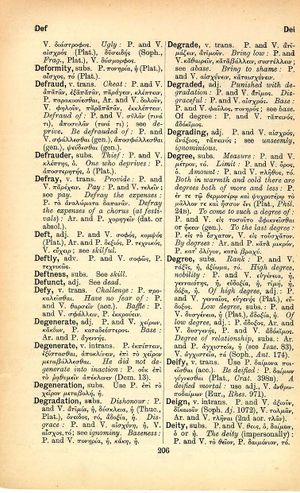degree: Difference between revisions
Δέσποινα γὰρ γέροντι νυμφίῳ γυνή → Mulier fit domina sponso, simulac senuerit → Die Frau beherrscht, sobald er alt, den Bräutigam
(CSV3) |
m (Woodhouse1 replacement) |
||
| Line 1: | Line 1: | ||
{{Woodhouse1 | {{Woodhouse1 | ||
|Text=[[File:woodhouse_206.jpg|thumb|link={{filepath:woodhouse_206.jpg}}]] | |Text=[[File:woodhouse_206.jpg|thumb|link={{filepath:woodhouse_206.jpg}}]] | ||
===substantive=== | |||
[[measure]]: [[prose|P.]] and [[verse|V.]] [[μέτρον]], τό. | |||
[[limit]]: [[prose|P.]] and [[verse|V.]] [[ὅρος]], ὁ. | |||
[[amount]]: [[prose|P.]] and [[verse|V.]] [[πλῆθος]], τό. | |||
[[both in warmth and cold there are degrees both of more and less]]: [[prose|P.]] [[ἐν τε τῷ θερμοτέρῳ καὶ ψυχροτέρῳ τὸ μᾶλλον τε καὶ ἧσσον ἔνι]] ([[Plato]], ''[[Philoctetes]]'' 24B). | |||
[[to come to such a degree of]]: [[prose|P.]] and [[verse|V.]] [[εἰς τοσοῦτο ἀφικνεῖσθαι]] or [[ἥκειν]] (gen.). | |||
[[to the last degree]]: [[prose|P.]] [[εἰς τὸ ἔσχατον]], [[verse|V.]] [[εἰς τοὔσχατον]]. | |||
[[by degrees]]: [[Aristophanes|Ar.]] and [[prose|P.]] [[κατὰ μικρόν]], [[prose|P.]] [[κατ' ὀλίγον]], [[κατὰ βραχύ]]. | |||
===substantive=== | |||
[[rank]]: [[prose|P.]] and [[verse|V.]] [[τάξις]], ἡ, [[ἀξίωμα]], τό. | |||
[[high degree]], [[nobility]]: [[prose|P.]] and [[verse|V.]] [[εὐγένεια]], ἡ, [[γενναιότης]], ἡ, [[εὐδοξία]], ἡ, [[τιμή]], ἡ, [[δόξα]], ἡ. | |||
of [[high degree]], adj.: [[prose|P.]] and [[verse|V.]] [[γενναῖος]], [[εὐγενής]] ([[Plato]]), [[εὔδοξος]]. | |||
[[low degree]], [[subs]].; [[prose|P.]] and [[verse|V.]] [[δυσγένεια]], ἡ ([[Plato]]), [[ἀδοξία]], ἡ. | |||
of [[low degree]], adj.: [[prose|P.]] [[ἄδοξος]], [[Aristophanes|Ar.]] and [[verse|V.]] [[δυσγενής]], [[prose|P.]] and [[verse|V.]] [[ἀδόκιμος]]. | |||
[[degree of relationship]], subs.: [[Aristophanes|Ar.]] and [[prose|P.]] [[ἀγχιστεία]], ἡ (see [[Isae]]. 83), [[verse|V.]] [[ἀγχιστεῖα]], τά ([[Sophocles|Soph.]], ''[[Antigone]]'' 174). | |||
}} | }} | ||
Revision as of 08:50, 20 May 2020
English > Greek (Woodhouse)
substantive
measure: P. and V. μέτρον, τό.
both in warmth and cold there are degrees both of more and less: P. ἐν τε τῷ θερμοτέρῳ καὶ ψυχροτέρῳ τὸ μᾶλλον τε καὶ ἧσσον ἔνι (Plato, Philoctetes 24B).
to come to such a degree of: P. and V. εἰς τοσοῦτο ἀφικνεῖσθαι or ἥκειν (gen.).
to the last degree: P. εἰς τὸ ἔσχατον, V. εἰς τοὔσχατον.
by degrees: Ar. and P. κατὰ μικρόν, P. κατ' ὀλίγον, κατὰ βραχύ.
substantive
rank: P. and V. τάξις, ἡ, ἀξίωμα, τό.
high degree, nobility: P. and V. εὐγένεια, ἡ, γενναιότης, ἡ, εὐδοξία, ἡ, τιμή, ἡ, δόξα, ἡ.
of high degree, adj.: P. and V. γενναῖος, εὐγενής (Plato), εὔδοξος.
low degree, subs.; P. and V. δυσγένεια, ἡ (Plato), ἀδοξία, ἡ.
of low degree, adj.: P. ἄδοξος, Ar. and V. δυσγενής, P. and V. ἀδόκιμος.
degree of relationship, subs.: Ar. and P. ἀγχιστεία, ἡ (see Isae. 83), V. ἀγχιστεῖα, τά (Soph., Antigone 174).

